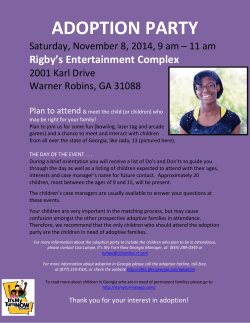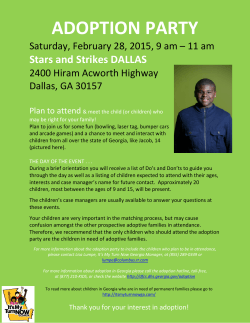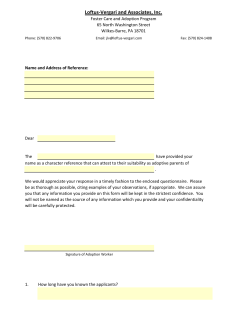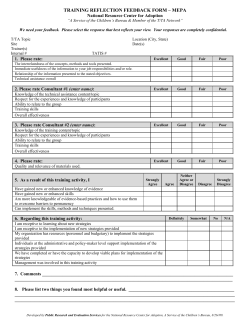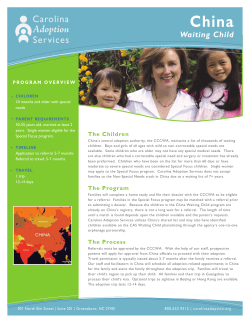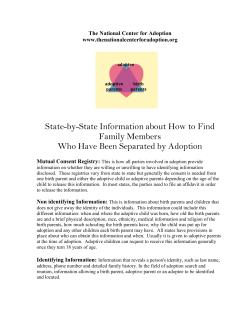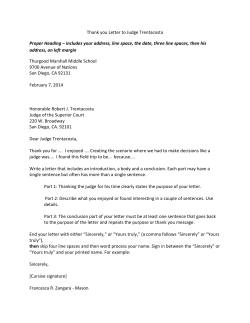
So, what's this thing all about?
So, what’s this thing all about? A Children and Young People’s Guide to the Adoption Service Your Guide to Adoption Support There are all kinds of different families This is a guide for children and young people who are adopted. The booklet is to help you understand more about adoption, start to answer some of the questions that you may be wondering about and to explain what adoption support is, the different kinds of support you can have and how it could help you. You can read this with your family and ask them about anything that you are not sure of. All children are born to a family, this is your “birth family”, but sometimes the families that children are born in don’t know how to look after them or keep them safe. Some birth parents find it difficult for lots of reasons to look after children and keep them safe and this is when social workers become involved. What is a social worker? A social worker is someone whose job it is to help people when they have problems. They help families if they are worried about children, or if they think that the family needs help and assistance. Sometimes if social workers are concerned about the care a child is getting, they find a foster family for the child to live with whilst they try to help the family with their problems. If things in their birth family don’t change, the social worker and a judge have to decide what will be the best future for the children. When this happens, sometimes the social worker and judge decide that it is better for the child not to live with the birth family. What is Adoption? What is a judge? A judge works in a court where lots of important decisions are made. Judges and courts have to make decisions about children and make sure that they are looked after and can grow up safe and well cared for. An important decision made in a court by a judge, is whether or not a child can live with their birth family. Some birth families understand that although they love their children they can’t look after them properly and decide that it would be better for their children not to live with them. Some birth families find this difficult to accept and still want the child to live with them, even though they haven’t looked after them or kept them safe. If it is decided that a child cannot live with his or her birth family, the court will decide that the child should be adopted. An adoptive family is a family where the child can grow up and have parents who will love them and make sure they are safely cared for forever. Once you have settled in at your new home, your parent or parents make an application to the court to ask if they can adopt you. A judge at the court sets a date when you and your new family go to court to meet the judge and there the judge makes an Adoption Order. This is when you legally become part of your new family. This is called a pronunciation hearing and is a happy day for your family. Adoption means that you will live with your new parent or parents who will love and care for you and always be your family from childhood and even when you’re grown up into an adult. You may have photographs of the day you were adopted if you were too young to remember, you may have been old enough to remember the day and the Judge may even have let you sit in their chair! Do you have Questions? What is letter box? Living in a new family can take time to settle down and sometimes even years after children have been adopted, they can have different questions. Sometimes the adoptive parents write to the birth family through a ‘letter box service’ arranged by the adoption service, and the birth family writes back. re other children adopted, A can I meet them? Can I see my birth parents? Do I have brothers and sisters? hy do I feel so mixed up W inside sometimes? Is my birth family okay? Why do I feel angry? hould I tell my friends I am S adopted? Why do I feel sad? ow do I find out more about H why I was adopted? Sometimes birth families find it hard to reply, which can be difficult for children to understand. Sometimes social workers decide that it is better that children don’t stay in touch with their birth family for lots of reasons. It is important for children to talk to their adoptive family. You can tell them about how you feel and maybe talk about your feelings. You could also talk to an adoption support worker if you want. This is a person who works with children and families who have adoption in their lives and so understands the different thoughts, feelings and issues that they may have. Who can help me? Your Social Worker. You can call them on 01733 747474 to ask for some help or if you prefer you can email them. Your Independent Reviewing Officer (IRO) will also be happy to help and can be contacted by telephoning 01733 747474. No matter how hard we try things don’t always go right. If you are unhappy about something your social worker has said or done you can contact Peterborough Children’s Social Care Complaints. They can help children who feel unhappy about how they are being looked after. Telephone: 01733 296331 Email: childrenssocialcarecomplaints @peterborough.gov.uk Or you can write to: Central Complaints, Customer Services, Bayard Place, Broadway, Peterborough, PE1 1FZ. Some other important people who can help you: If you are unhappy and want to make a complaint you can contact Ofsted. Ofsted is the organisation which inspects adoption services. You can contact them at Piccadilly Gate Store Street Manchester M1 2WD. Rights4me is a part of OFSTED designed for children. 0800 528 0731 www.rights4me.org This website has lots of information for you. Children’s Rights Director; 0800 528 0731 Rogermorgan.rights4me @ofstead.gsi.gov.uk Contact for more details Telephone: 01733 317448 Email: wanttoadopt@peterborough.gov.uk Web: www.peterboroughadoption.co.uk
© Copyright 2025

